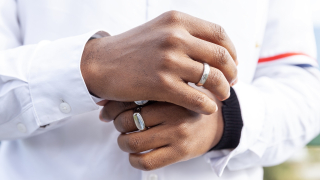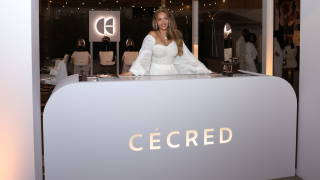Wyclef Jean and Ice-T joined hip-hop historian “Uncle” Ralph McDaniels at Studio 1792, hosted by 1792 Whiskey, an evening of bourbon and music, inside Sony Hall in Manhattan’s Times Square. Ice-T, who began his career as an underground rapper in the 1980s, brought in some old-school flow with his 2000 hit song, "Money, Power, Women," while Jean enthralled audiences with a live piano repertoire inside Sony Hall’s secret speakeasy.
It was nearly 50 years ago when Jamaican-American artist Clive "DJ Kool Herc" Campbell began hosting parties and spinning tunes with his little sister Cindy in the Bronx, New York. He was just 18 years old when he used two turntables to isolate the drum beats of songs, creating the breakbeat style that became the birth of hip hop.
EBONY sat down with McDaniels, the founder and curator of Video Music Box, a show that has been instrumental in documenting the evolution of hip-hop culture, to learn more about the music genre’s evolution and where it’s going next.
EBONY: What is hip hop at its core?
Ralph McDaniels: Hip hop consists of five elements: the DJ, the emcee, the artist and the B-Boy and B-Girl dancer. Knowledge is the fifth element of hip hop. We make sure that that is upfront right now because kids need to know exactly how this thing started. Next year is the 50th anniversary of hip hop, so it's very important that kids know what was going on in 1973 when DJ Kool Herc and his sister Cindy, had that party.
Who are some of the pioneers of hip hop?
It starts off with Kool Herc, Afrika Bambaataa, Grandmaster Flash. Guys like Russell Simmons and Run-D.M.C. were at the forefront and really showed us how to make it commercial and corporate. Now you have the DJs and Nases of the world that have become corporate giants.
What are some of the songs that define the genre?
The messages by Grandmaster Flash and the Furious Five were defining moments because they were so vivid and their words were so colorful. The way Melle Mel put it out there—it made us feel that we can make songs like this and we can talk like that. We're not singing, we're just talking and we're rapping and using words that we picked out and made up ourselves, and it's being played on the radio. Of course, “Rapper's Delight” by The Sugarhill Gang was the first record to get played on commercial radio so that was a defining moment.
Why do you think hip hop has had such an impact on people?
The untypical moments that we had as urban kids coming up, and I'm not just going to say Black kids because it was also Latino and white kids too that were just trying to find their way. We found a home with the culture of hip hop, for creatives, dancers, choreographers, producers, graffiti artists and designers—all of these things encompass what hip-hop culture is all about. Then hip hop made its way to the mainstream. And here we are in 2022, connecting with 1792 Bourbon at the 1792 Studio with some amazing artists like Wyclef and Ice-T.
What does the younger generation need to learn about hip hop? We have seen all this warring and people getting killed. That’s not where hip hop started.
Not at all, but I don't know if hip hop is responsible for that. I do think it's important that they understand that this is our culture. This is something that’s from right here in New York City, the United States of America, and this is where it came from. If you go back to its roots, guys like Nas and the Wu-Tang Clan influenced the incredible movement we now hear coming out of Nigeria and Ghana with Afrobeats. When I traveled the world, I realized that I was important. I went to Brazil, Japan and Germany, and people said, "You're from where hip hop started? Oh my God!" These young boys and girls need to know they are important in their communities, and we must let them know that.













